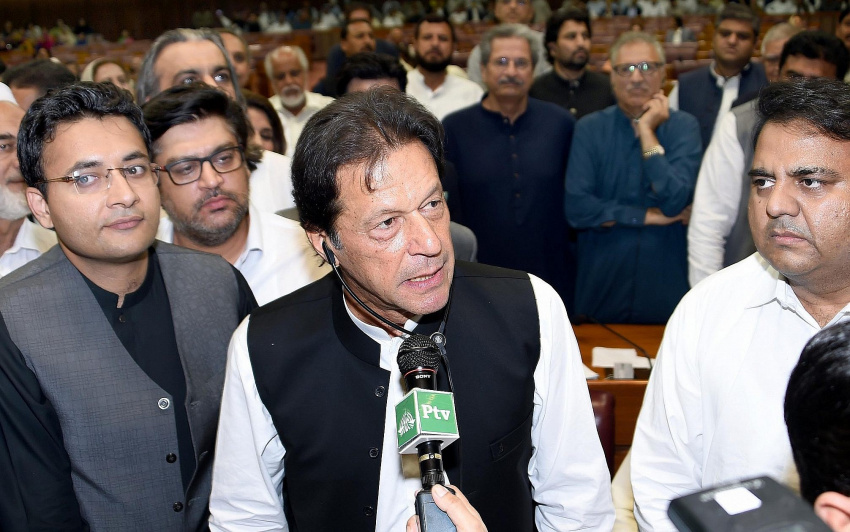Behrouz Ayaz, in an interview with the website of the Strategic Council on Foreign Relations, referred to the removal of Pakistani Prime Minister Imran Khan and stated that this is the first time in Pakistan’s political history that a vote of no confidence for the Prime Minister has come to the conclusion, noting: Under Article 95 of Pakistan’s constitution, more than 20 percent of members of the National Assembly can propose for the vote of no-confidence against the Prime Minister.
Recalling that none of the 22 Pakistani prime ministers have been able to complete their five-year rule so far, he said: “This turbulent political situation will further weaken the internal and external situation of Islamabad. What has happened in Pakistan shows the complexity of the structure of the political system and the socio-political instability of the country, which has always been a major obstacle to economic progress and political development.
Imran Khan’s failure to improve economic situation
The expert on Asia affairs referred to the premiership of Shehbaz Sharif, the leader of the Muslim League party and a critic of Imran Khan, and his promise to improve the situation, and in explaining the internal, regional and international causes of failure of Imran Khan’s government said: Despite some public protests against his removal, it should be noted that Imran Khan could not improve the economic situation. Inflation, rising food prices, unemployment, devaluation of the rupee, growing poverty, and widening class gaps and inability to run the government were among the internal problems that the opposition saw the government as incapable of solving.
Ayaz explained: The importance of this issue is because the title of his party, Tehreek-e-Insaf, means movement of justice or moving towards justice, a slogan he could not fulfill.
Outlook of Tehreek-e-Insaf on Saudi Arabia
Referring to foreign policy of Imran Khan’s government towards countries in the region, especially Iran, the UAE, Afghanistan and Saudi Arabia, he said: Riyadh’s 4 billion dollars donation to Imran Khan raised expectations of the country’s extensive cooperation with Riyadh in foreign policy, but the outlook of Tehreek-e-Insaf on the Saudis, unlike the Muslim League, was not strategic, but rather economic. The significant turn of the Khan’s government towards Tehran to deepen political-economic relations and its relative distance from Riyadh was not to the liking of the Saudi authorities, and such factors led them to refuse further economic aid to the Khan’s government.
The analyst of Pakistan affairs said that although Khan’s widespread support for the Taliban government was in line with the strategic policy of the Pakistani political system and with the army, its negative feedback was attributed to Imran Khan’s government, adding: Nearly a year after the formation of the Taliban government in Kabul, no government or organization has yet recognized it. Efforts of Tehreek-e-Insaf party to justify and persuade regional and international governments to identify the Taliban failed, and the Taliban government also had some intense clashes with the Pakistani military on its borders.
Ayaz described one of the characteristics of Imran Khan’s government at the international level as its strong inclination towards China and Russia, along with turning away from the United States and occasionally taking a hard line stance against that country, saying: Relations with China have been an integral part of Pakistan’s foreign policy since its inception, and China has long been concerned about the mismanagement of Imran Khan’s government over its 56 billion dollars investment in Pakistan.
US role in Imran Khan’s ouster
He also noted the efforts of politicians and even the Pakistani military to keep relations with the United States warm and the vital role of the US in the economy and the army, and continued: The beginning of cold relations of Imran Khan’s government with the United States can be blamed on the United States lack of 300 million dollars in aid to Pakistan under the pretext of not being serious in the fight against terrorism. However, the gap between the two countries widened when Imran Khan not only met with Russian President Vladimir Putin on the day of the Russian invasion of Ukraine, but also did not condemn the Russian attack on Ukraine.
The analyst of Asia affairs stressing that the United States did not like such a measure by Imran Khan’s government and in a meeting with the Pakistani ambassador, warned the Pakistani officials in a threatening letter about Imran Khan’s presence in power, adding: Imran Khan’s ouster should be linked to Pakistan’s complex political system and the multiplicity of power in that country, of which Imran Khan, like 21 former prime ministers, became its victim.
Referring to some widespread public protests against Imran Khan’s ouster and his critical stance on foreign interventions and his calls for a nationwide protest, he continued: Imran Khan’s ouster was one of the consequences of his disagreement with the army on foreign and domestic issues, especially the failure in removing the inexperienced governor of Punjab and the debate on the election of a new head of the military intelligence. It is well known that “each country has an army for itself, but in Pakistan, the army has a government for itself”!
Resumption of Islamabad warm relations with Washington, Riyadh
The expert Asia affairs added: In the field of foreign policy, it is expected that Islamabad’s warm relations with Washington and Riyadh will be resumed, and the new government in Islamabad will work with the military to establish warm relations with the United States which, of course, is influenced by Pakistan’s economic needs and the two countries strategic orientation. However, given the military’s strategy, we will not see a change in relations with China and Afghanistan.
According to Ayaz, Shehbaz Sharif’s inclination towards Saudi Arabia may deepen the influence of the Muftis of Riyadh on Pakistan’s society and provide more financial and intellectual support for religious extremists. Therefore, Pakistani Shiites will be targeted by more attacks and extremist ideas will spread in Pakistan, which can affect Iran-Pakistan relations as a whole.










0 Comments